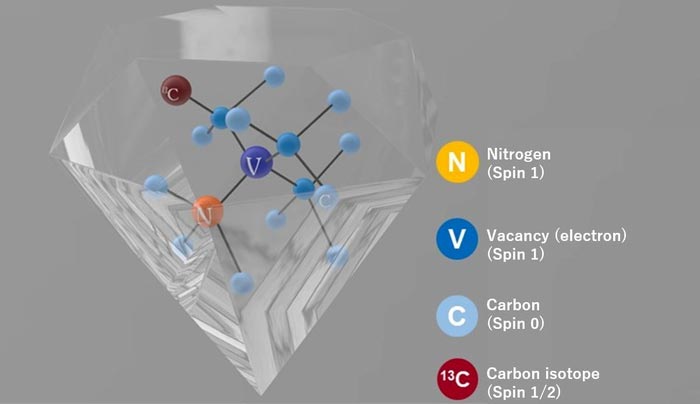Fault-tolerant quantum computer memory in diamond

Nitrogen-vacancy (NV) center in diamond serves as quantum memories, which is error-correction coded to correct errors automatically.
Credit: Yokohama National University
Researchers demonstrate quantum computer memory resilient against errors.
Quantum computing holds the potential to be a game-changing future technology in fields ranging from chemistry to cryptography to finance to pharmaceuticals. Compared to conventional computers, scientists suggest that quantum computers could operate many thousand times faster. To harness this power, scientists today are looking at ways to construct quantum computer networks. Fault-tolerant quantum memory, that responds well when hardware or software malfunctions occur, will play an important role in these networks. A research team from Yokohama National University is exploring quantum memory that is resilient against operational or environmental errors.
The research team reported their findings on April 27, 2022 in the journal Communications Physics.
For quantum computers to reach their full potential, scientists need to be able to construct quantum networks. In these networks, fault-tolerant quantum memory is essential. When scientists manipulate spin quantum memory, a magnetic field is required. The magnetic field hinders the integration with the superconducting quantum bits, or qubits. The qubits in quantum computing are basic units of information, similar to the binary digits, or bits, in conventional computers.
To scale up a quantum computer based on superconducting qubits, scientists need to operate under a zero magnetic field. In their search to further the technology toward an fault-tolerant quantum computer, the research team studied nitrogen-vacancy centers in diamond. Nitrogen-vacancy centers hold promise in a range of applications including quantum computing. Using a diamond nitrogen-vacancy center with two nuclear spins of the surrounding carbon isotopes, the team demonstrated quantum error correction in quantum memory. They tested a three-qubit quantum error correction against both a bit-flip or phase-flip error, under a zero magnetic field. The bit-flip or phase-flip errors can occur when there are changes in the magnetic field. To achieve a zero magnetic field, the team used a three-dimensional coil to cancel out the residual magnetic field including the geomagnetic field. This quantum memory is error-correction coded to correct errors automatically as they occur.
Previous research had demonstrated quantum error correction, but it was all carried out under relatively strong magnetic fields. The Yokohama National University research team is the first to demonstrate the quantum operation of the electron and nuclear spins in the absence of a magnetic field.
“The quantum error correction makes quantum memory resilient against operational or environmental errors without the need for magnetic fields and opens a way toward distributed quantum computation and a quantum internet with memory-based quantum interfaces or quantum repeaters,” said Hideo Kosaka, a professor at Yokohama University and lead author on the study.
The team’s demonstration can be applied to the construction of a large-scale distributed quantum computer and a long-haul quantum communication network by connecting quantum systems vulnerable to a magnetic field, such as superconducting qubits with spin-based quantum memories. Looking ahead, the research team has plans to take the technology a step further. “We want to develop a quantum interface between superconducting and photonic qubits to realize an fault-tolerant large-scale quantum computer,” said Kosaka.
The team members are Takaya Nakazato, Raustin Reyes, Nobuaki Imaike, Kazuyasu Matsuda, Kazuya Tsurumoto, from the Department of Physics, Graduate School of Engineering Science, Yokohama National University in Yokohama, Japan; Yuhei Sekiguchi from the Institute of Advanced Science, Yokohama National University; and Hideo Kosaka, who works at both the Graduate School of Engineering Science and the Institute of Advanced Sciences, Yokohama National University.
The research is funded by Japan Society for the Promotion of Science Grants-in-Aid for Scientific Research; Japan Science and Technology Agency Moonshot R&D; JST CREST; and also the Ministry of Internal Affairs and Communications under the initiative Research and Development for Construction of a Global Quantum Cryptography Network.
Yokohama National University (YNU or Yokokoku) is a Japanese national university founded in 1949. YNU provides students with a practical education utilizing the wide expertise of its faculty and facilitates engagement with the global community. YNU’s strength in the academic research of practical application sciences leads to high-impact publications and contributes to international scientific research and the global society. For more information, please see: https://www.ynu.ac.jp/english/
Journal: Communications Physics
DOI: 10.1038/s42005-022-00875-6
Article Title: Quantum error correction of spin quantum memories in diamond under a zero magnetic field
Article Publication Date: 27-Apr-2022
Media Contact
Akiko Tsumura
Yokohama National University
kenkyu-koho@ynu.ac.jp
Office: 81-453-393-213
All latest news from the category: Information Technology
Here you can find a summary of innovations in the fields of information and data processing and up-to-date developments on IT equipment and hardware.
This area covers topics such as IT services, IT architectures, IT management and telecommunications.
Newest articles

Innovative 3D printed scaffolds offer new hope for bone healing
Researchers at the Institute for Bioengineering of Catalonia have developed novel 3D printed PLA-CaP scaffolds that promote blood vessel formation, ensuring better healing and regeneration of bone tissue. Bone is…

The surprising role of gut infection in Alzheimer’s disease
ASU- and Banner Alzheimer’s Institute-led study implicates link between a common virus and the disease, which travels from the gut to the brain and may be a target for antiviral…

Molecular gardening: New enzymes discovered for protein modification pruning
How deubiquitinases USP53 and USP54 cleave long polyubiquitin chains and how the former is linked to liver disease in children. Deubiquitinases (DUBs) are enzymes used by cells to trim protein…



